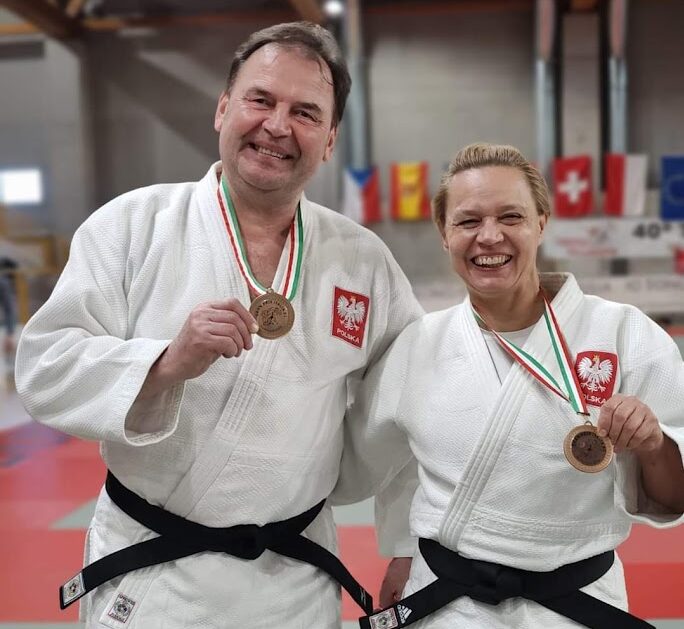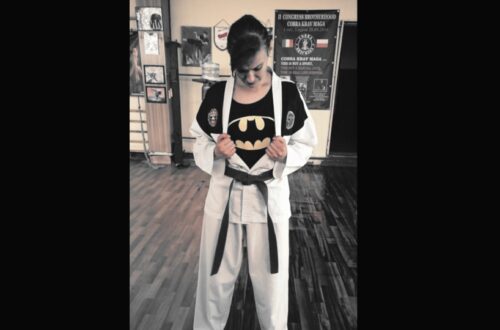
To, co jest pod kaskiem, musi należeć do gladiatora| What’s under the helmet must belong to the gladiator
Co byście odpowiedzieli gdyby ktoś spytał, co takiego muszą robić sportowcy żeby zwyciężać?
Na myśl przychodzi wiele odpowiedzi: muszą podejmować wyzwania, którym sprostanie pomoże wejść na nowy poziom kondycji i umiejętności technicznych, muszą dbać o zdrowie, regenerację po treningu, odżywiać się racjonalnie.
Co jednak jeśli powiem Wam, że równie ważna, jeśli nie ważniejsza, jest odporność psychiczna?
Odporność psychiczna to nic innego, jak wiara w siebie i swoje możliwości, zdolność do zachowania skupienia w ważnych chwilach, umiejętność radzenia sobie z presją oraz stawiania czoła swoim lękom. Odporność psychiczna to także zdolność do podnoszenia się po porażce.
Na świecie jest ogrom utalentowanych zawodników, którzy mogliby stać się mistrzami olimpijskimi, gdyby ich odporność psychiczna była na tak wysokim poziomie jak umiejętności i zdolności motoryczne.
Kiedy do walki staje dwoje tak samo utalentowanych zawodników, tak samo silnych, szybkich i będących na tym samym poziomie wyszkolenia technicznego…
… wtedy wygrywa ten, kto ma lepszą psychikę.
Pozwólcie, że zdradzę Wam pewien sekret – Odporność psychiczna to cecha, którą można wyćwiczyć!
Jak?
Mamy coś takiego jak naukowy model odporności psychicznej 4C. Został opracowany przez badaczy i psychologów sportu – Petera Clougha oraz Keitha Earlea. Opiera się na czterech filarach:
Challenge a więc wyzwanie
Postaraj się postrzegać wyzwania jako szansy. Inicjuj działania, myśl nad sposobami rozwiązania problemu zamiast od niego uciekać. Ciesz się z wyzwań, traktuj je jako możliwości sprawdzenia siebie i swoich umiejętności. Zamiast unikać stresujących sytuacji, wchodź w nie a w konsekwencji podniesiesz swój poziom odporności na stresory.
Confidence czyli pewność siebie
Wierz we własne możliwości i zaufaj sobie. Przekonaj sam siebie, że uda Ci się osiągnąć sukces, a błędy i niepowodzenia traktuj jako naturalną część procesu. Nie zniechęcaj się i nie załamuj.
Commitment oznacząjące zaangażowanie
Myśl o tym, co przed Tobą, efektywnie ustal priorytety i wyznacz cele. Krok po kroku realizuj te cele. Koncentruj swoją uwagę na tym, na czym Ci zależy. Realizacja jednego celu popchnie Cię do realizacji kolejnego, to będzie jak domino.
Control – kontrola, poczucie sprawczości
Uwierz, że to Ty masz największy wpływ na przyszłość oraz na swoje emocje i działania i zarządzaj nimi! To Ty decydujesz co dalej, w jakiej kolejności oraz w jaki sposób. Kontroluj swoje emocje i reakcje. Świadomie dąż do osiągnięcia wyznaczonych celów usuwając krok po kroku przeszkody.
I pamiętaj: mamy XXI wiek, mamy świetnych trenerów, psychologów, terapeutów oraz rzesze innych ludzi, którzy mogą Cię wspierać w codziennej walce. Nieważne czy sportowej czy osobistej.
Jak powiedział W. Churchill:
„Sukces nigdy nie jest ostateczny. Porażka nigdy nie jest totalna. Liczy się tylko odwaga, by kontynuować swoje dzieło.”
___________________________
What would you answer if someone asked what athletes have to do to win?
Many answers come to mind: they must take up challenges that, if met, will help them reach a new level of fitness and technical skills, they must take care of their health, regenerate after training, and eat rationally.
But what if I told you that mental toughness is equally, if not more, important?
Mental toughness is nothing else than belief in yourself and your abilities, the ability to stay focused in important moments, the ability to cope with pressure and face your fears. Mental toughness is also the ability to get up after failure.
There are a lot of talented athletes in the world who could become Olympic champions if their mental toughness was as high as their skills and motor skills.
When two equally talented players, equally strong, fast and at the same level of technical training, fight…
…then the one with the better mentality wins.
Let me tell you a secret – Mental toughness is a feature that can be trained!
How?
We have something called the 4C scientific model of mental resilience. It was developed by researchers and sports psychologists – Peter Clough and Keith Earle. It is built on four pillars:
Challenge
Try to see challenges as opportunities. Initiate actions, think of ways to solve the problem instead of running away from it. Enjoy challenges, treat them as opportunities to test yourself and your skills. Instead of avoiding stressful situations, enter them and, as a result, you will increase your level of resistance to stressors.
Confidence
Believe in your own abilities and trust yourself. Convince yourself that you will succeed, and treat mistakes and failures as a natural part of the process. Don’t get discouraged and don’t break down.
Commitment
Think about what’s in front of you, set priorities and set goals effectively. Take these goals step by step. Focus your attention on what you care about. The achievement of one goal will push you to achieve another, it will be like dominoes.
Control
Believe that you have the greatest influence on the future and on your emotions and actions and manage them! You decide what to do next, in what order and how. Control your emotions and reactions. Consciously strive to achieve your goals, removing obstacles step by step.
And remember: we are in the 21st century, we have great trainers, psychologists, therapists and tons of other people who can support you in your everyday fight. It doesn’t matter if it’s sports or personal.
As W. Churchill said:
“Success is never final. Failure is never total. All that matters is the courage to continue your work.”




